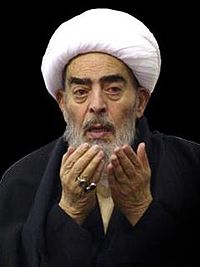- Mohammad Fazel Lankarani
-

Place of birth: 1931 Birth Location: Qom, Iran Died June 16, 2007 (aged 75-76) Place of death Qom, Iran Official Website Lankarani Grand Ayatollah Mohammad Fazel Lankarani (1931 in Qom, Iran — June 16, 2007 in Qom, Iran) was an Islamic Iranian cleric. He was student of Grand Ayatollah Borujerdi. He was an ethnic Azeri.[1]
Contents
Biography and clerical activities
Lankarani was born in [[Qom, Iran]. Both of his parents were immigrants. His father was an Azeri-speaking native of Soviet Azerbaijan who studied in Najaf and Qom and eventually settled in the latter. His mother, was a woman of Sayed descent. Despite lingual pressures in Iran during the Pahlavi regime, Lankarani was raised fluent in Arabic, Azeri, Persian, Pashtu and Russian.
Lankarani received his ijtihad, the permission of independent interpretation of the legal sources (the Qur'an and the Sunnah), from Ayatollah Boroujerdi at the age of 25. He led the prayer in the haram of Bibi Masouma A.S in Qum.
Grand Ayatollah Fazel Lankarani was declared as the most knowledgeable specialist in the field of the Islamic law (Marja al-taqlid) by the central Shi'a school of religious studies in Qom, Hawza 'Ilmiyyah, after the death of Ayatollah Khomeini. At the time of his death he was one of seven Grand Ayatollahs in Iran. His Resalah, the book including his interpretation of Islamic laws on different topics, is available in Arabic, English, Persian, Turkish, Urdu, and other languages. Lankarani taught in the areas of the science of Islamic law (fiqh) and Usul al-fiqh for the last 25 years of his life.
As a Shia Grand Ayatollah, he received generous contributions from his many followers. According to author Hooman Majd "one of Lankarani's aides" told him that "approximately ten million dollars a month flows" into Lankarani's treasury "from his supporters alone."[2]
Fazel Lankarani was a strong supporter of the Ayatollah Khomeini, being jailed several times and exiled once prior to the Iranian revolution.[3] After the Iranian Revolution, he was a member of the Assembly of Experts, Iran's leading religious body.[3]
As his health conditions deteriorated he moved from the holy city of Qom to Tehran and then to London to receive medical treatment then on Friday 15 June, 2007 he moved to Qom and he died on Saturday June 16, 2007.
Views
Politically, Lankarani followed the traditions of the Islamic Republic in criticizing western corruption in the Islamic world.
Fazel Lankarani supported Ayatollah Khomeini's fatwa calling for the death of Salman Rushdie following the publication of The Satanic Verses in 1989, and called on Muslims to kill that author.[3] He (along with some other senior clerics) continued to call the killing of Rushdie a "duty" for all Muslims although the Iranian government itself ceased to do so in a 1998 compromise with the British government.[4] In 1998, Lankarani called for the Iranian government to do "its utmost" to protect Shiites in his maternal homeland of Afghanistan, then reportedly endangered by the Taliban.[5]
Lankarani also issued a fatwa calling for the deaths of another author, Rafiq Tağı, an Azeri writer, and Tagi's editor, Samir Sədaqətoğlu, who were accused of criticizing Islam.[6] Tagi's writings sparked recent demonstrations outside the Azerbaijani embassy in Teheran. According to Iranian and Islamic law, these sentences are only applicable if either individual freely and willfully enters Iran and submit themselves to the authorities.[citation needed]
Lankarani believed strongly in separation of sexes and opposed President Ahmadinejad's declaration that women have the right to attend soccer matches at stadiums despite the fact that they would see male soccer players.[7] He "famously refused for weeks" to meet with President Ahmadinejad in early 2007 after the president attempted to open soccer events to women.[8]
See also
References
- ^ (Turkish) Cehennemin kapıları/H.Miray VURMAY - ORTADOĞU ARAŞTIRMALARI MASASI
- ^ Majd, Hooman, The Ayatollah Begs to Differ : The Paradox of Modern Iran, Doubleday, 2008. p.81
- ^ a b c Reuters via CNN, "Senior Iranian leader dies" June 16 2007
- ^ Majd, The Ayatollah Begs to Differ, (2008). p.78
- ^ BBC Newsroom Middle East Ayatollah calls for protection of Afghan Shiites August 15, 1998.
- ^ Frances Harrison, BBC News in Teheran (November 29, 2006). "Iran issues fatwa on Azeri writer". BBC News. http://news.bbc.co.uk/2/hi/middle_east/6158195.stm. Retrieved 2006-11-30.
- ^ BBC Persian
- ^ Majd, The Ayatollah Begs to Differ, (2008). p.78-9
External links
Categories:- Iranian people of Azerbaijani descent
- Islamism
- People from Qom
- 1931 births
- 2007 deaths
- Iranian grand ayatollahs
Wikimedia Foundation. 2010.
